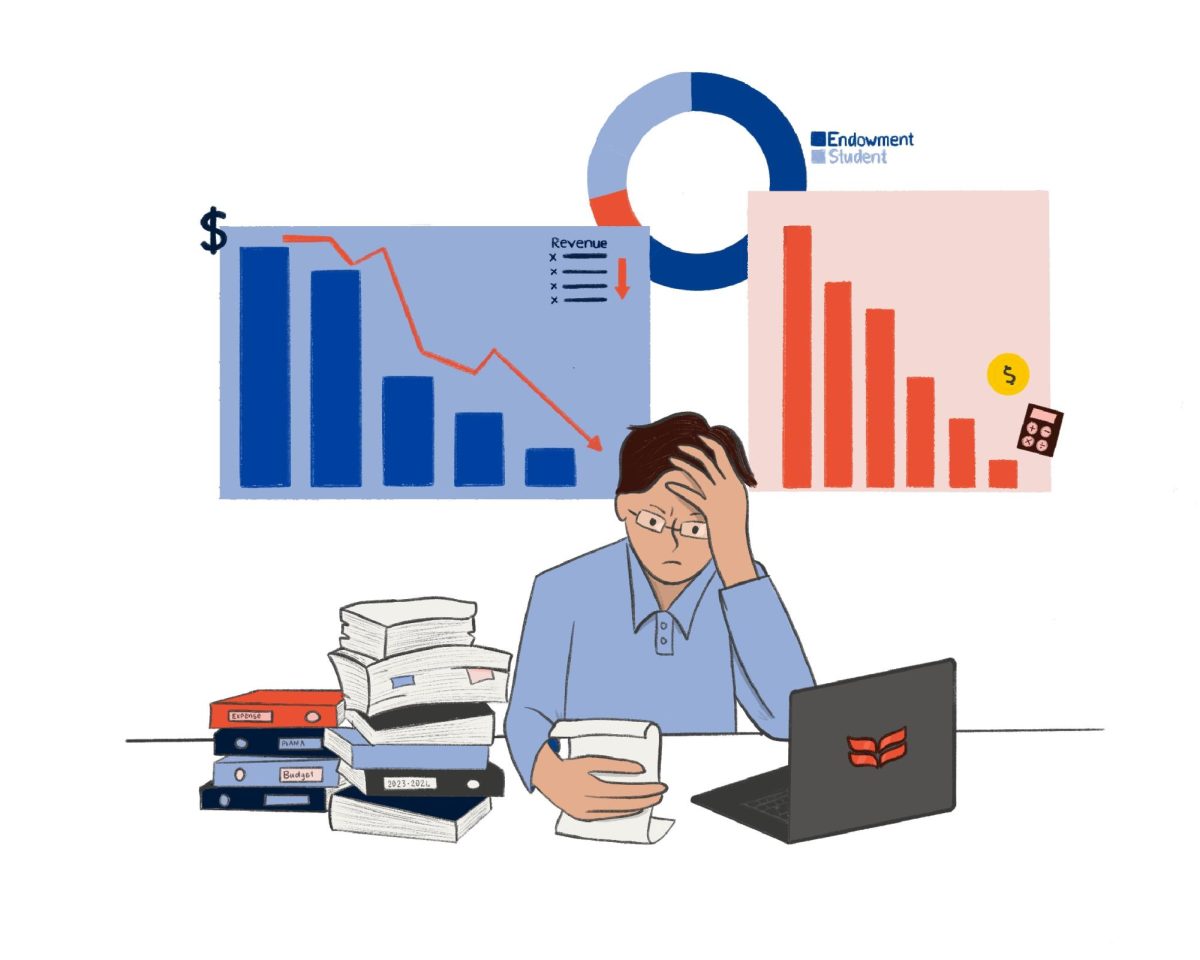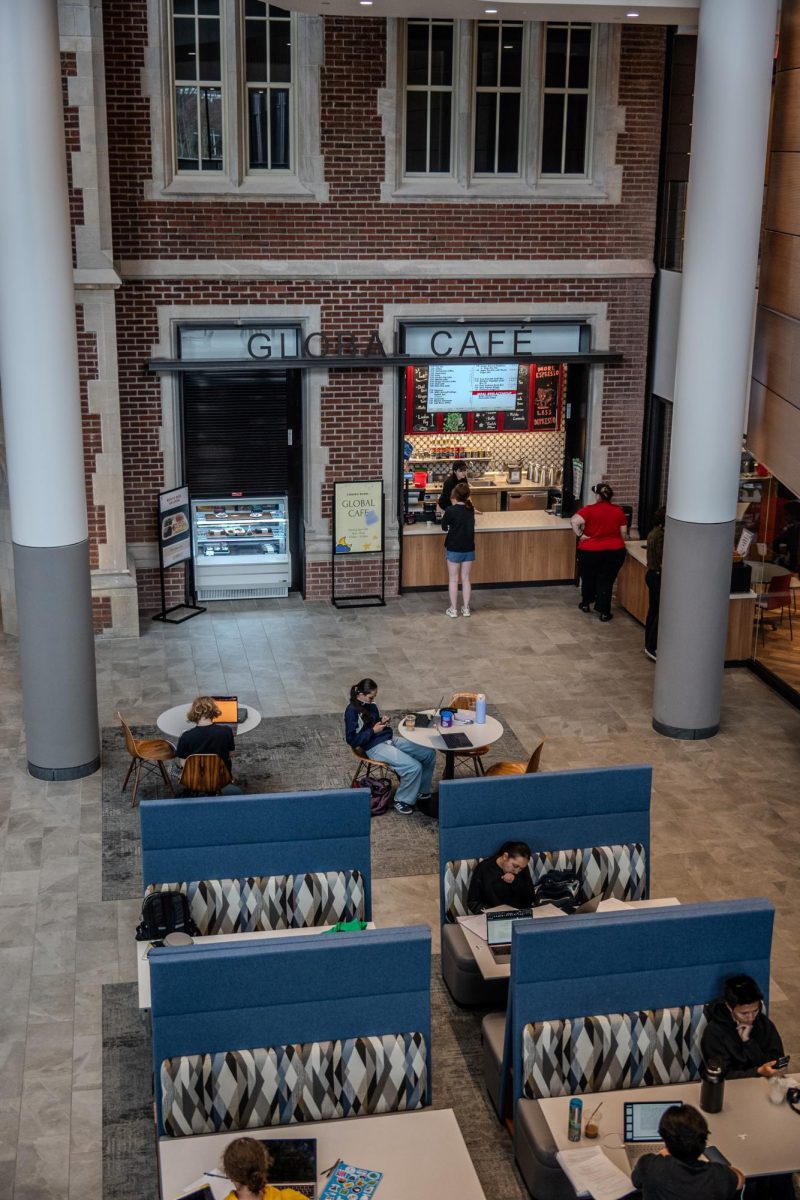Grinnell College is currently one of the most endowment-dependent institutions in the country, with the endowment comprising 60 percent of yearly revenue. As of 2024, the College is spending about 4.5 percent of the endowment yearly, but the Board of Trustees has required that the College return the endowment payout to 4 percent by 2029. The College must also amass ten million dollars within ten years through a combination of increasing revenue and decreasing expenses. To meet these financial goals, the College is cutting costs where possible and trying to encourage philanthropy and increase student revenue, which Anne Harris, president of Grinnell College, cited in the College’s Aug. 28 Colloquium as hampered by the College’s need-blind admissions policy.
“In most years, Grinnell’s annual payout from the endowment exceeds what is added through investment returns and philanthropic gifts combined,” Ellen de Graffenreid, vice president of communications and marketing, explained in an email to The S&B, emphasizing the importance of returning the endowment payment to four percent. “Based on the current annual payout to support operations, Grinnell spends half of the value of the Endowment every 12.5 years — and it’s not being replaced at the same rate.”
Harris addressed an audience of faculty, staff and students at the Aug. 28 Colloquium in which she discussed the 2025 Fiscal Year Budget and explained aspects of the College’s Toward a Sustainable Future and Reduce Endowment Dependency (RED) initiatives. RED aims to decrease the College’s reliance on the endowment for revenue and has already reached $3 million in institutional savings.
Brad Lindberg, associate vice president of institutional initiatives and enrollment, spoke at the Colloquium about the progress RED has made and some of the cost-cutting measures it has enacted, including consolidating five different employee management systems — Paycor, NOVATime, PeopleAdmin, Handshake, and WhenToWork — down to one, Automatic Data Processing. De Graffenreid wrote that “some of the larger savings came from things like changing how the College’s pharmacy benefit for employees is managed and consolidating systems that are duplicative.”
Harris repeatedly emphasized during the Colloquium that Grinnell cannot reach its financial goals through cost-cutting measures alone, however. Harris noted Grinnell has both lower student revenue and lower philanthropy than its peer institutions and said that the College needs to raise both.
Bernadine Douglas, vice president for development and alumni relations (DAR), said the reasons for comparatively low philanthropy at Grinnell are complicated and numerous. She mentioned changes in leadership over a short span of time, as well as disruptions to philanthropic attitudes related to the COVID-19 pandemic. She also said that she believes Grinnell’s cultural deference to the endowment discourages philanthropy, explaining that “we have not always done a great job at what I think our peers, like Harvard or Princeton have done, to say that even in the face of what looks like a huge endowment, we still need you [alumni] for this endowment to continue.”
Douglas said that DAR has engaged in recent efforts to encourage philanthropy, and said that she anticipates Scarlet and Give Back Day will also play a larger role in 2025. DAR aims to create a bolder and more celebratory experience, Douglas said, that involves more of the campus community than in previous years.
The College also aims to increase student revenue. Part of this effort, Harris said, involves questioning the sustainability of Grinnell’s need-blind admissions policy which it has held for four decades. Grinnell’s need-blind admissions policy prohibits the College from considering domestic students’ financial situation before deciding whether to admit them. Harris said that the conversation around need-blind admissions has been ongoing since the Board of Trustees’ resolution to continue with need-blind admissions in 2013. Since then, the Board of Trustees has voted on the issue every three years, and will vote again this year.
Harris noted that becoming need-aware would allow the College to have control in shaping a class year socioeconomically, but that need-blind admissions do not necessarily ensure a socioeconomically diverse student population. Harris also said that whether or not need-blind admissions continue after the vote this year, the College will continue to meet 100 percent of demonstrated need and will retain its no loan policy.
Student reactions to the idea that the College might end need-blind admissions have included surprise and dismay. Emmelene Perencevich `25 said she felt “baffled and disappointed” at the idea of Grinnell eliminating need-blind admissions and said “I feel like equity in access to higher education is something that I admired Grinnell’s verbal commitment to.”
Ella Rosenthal `25 described the possibility of ending need-blind admissions as “a shock” and said that “even to my parents, it’s a huge selling point about our endowment being used to support students.”
Other students discussed need-blind admissions as a way of bringing students from different backgrounds together. “I think that one of Grinnell’s strengths is the fact that it draws from people across the country, across the world, who might not necessarily have the means to pay at other colleges,” said Carter Ottele `25.
Howie Youngdahl `25 said he believes that Grinnell’s need-blind admissions policy was what allowed him to attend the College: “I definitely would not have been let into Grinnell without need-blind admissions, because I received quite a generous package from the College.”
Alex Dixon `26, House Coordinator of First Gen House, said he attended an Endowment Call for alums on Monday, Sept. 9 led by Harris and Germaine Gross, vice president for finance and treasurer of the College. “Students need to feel like they were given all that they could be given and invested in as much as they could have been,” Dixon said, referencing what might lead him to contribute philanthropically to the College after graduating. “That was one issue I had with that call — I felt like the dynamic of replenishments that Anne was bringing up was kind of one sided, that students are just meant to give and give and give while the College can take.”
Harris, Gross and Lindberg all reiterated during the Colloquium that the college is seeking feedback from the campus community regarding how best to meet the financial goals outlined by RED and that budget conversations are ongoing. De Graffenreid wrote: “That was one reason for addressing the topic at this year’s Colloquium — so that the community can begin the year with a common understanding of the budget and to invite participation in Toward a Sustainable Future by sharing their ideas.”
Dixon, when asked what he would say to the Board of Trustees ahead of their vote this year on whether to end need-blind admissions, said: “Replenishment goes both ways.”
Editor’s Note: This article has been revised with the accurate annual percentage that Grinnell College is currently paying from its endowment. The previously stated figure was based on an incorrect number provided during the College Budget Colloquium.






























































